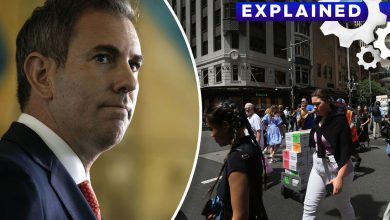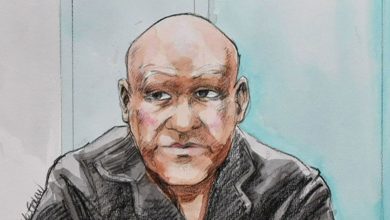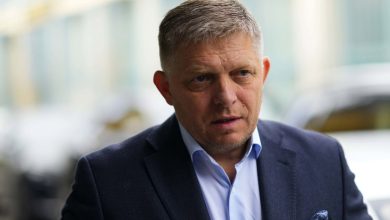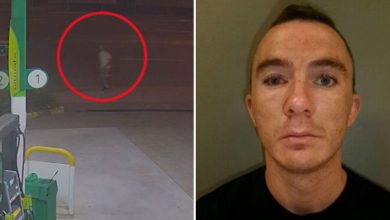Police begin dismantling pro-Palestinian demonstrators’ encampment at UCLA

[ad_1]
Police detained a handful of people on campus early Thursday (Thursday night AEST), tying their wrists with zip ties.
The law enforcement action came after officers spent hours threatening arrest over loudspeakers if the crowd did not disperse.

Hundreds of people had gathered on campus, both in a barricaded tent camp and outside in support.
As police helicopters circled overhead, the sound of lightning bolts, which produce a bright light and loud noise to disorient and stun people, pierced the air.
Protesters chanted “Where were you last night?” as the officers approached.
California Highway Patrol officers wearing face shields and protective vests stood with batons sticking out to separate them from the demonstrators, who wore helmets and gas masks and chanted “you want peace.” We want justice.”

Police methodically tore down the camp’s barricade of plywood, pallets, metal fences and trash cans and made an opening to dozens of demonstrators’ tents.
The police also started tearing down sheds and awnings. Protesters held umbrellas as shields as they confronted dozens of officers.
The police action came overnight after UCLA administration and campus police waited hours to stop the onslaught of counter-protesters.
The delay drew condemnation from Muslim students and California Gov. Gavin Newsom.
Demonstrators rebuilt makeshift barriers around their tents Wednesday as state police and police watched on.
Tent groups of protesters calling on universities to stop doing business with Israel or companies they say support the war in Gaza have spread to campuses across the country in a student movement unlike any other this century.
The ensuing police crackdown echoed decades earlier actions against a much larger protest movement protesting the Vietnam War.
In the Middle East, Iranian state television broadcast live images of the police action, as did Qatar’s pan-Arab satellite network Al Jazeera.
Live images from Los Angeles are also broadcast on Israeli television networks.

The tense standoff at UCLA came one night after counter-protester-fueled violence erupted at the same venue.
The law enforcement presence and constant warnings were in contrast to the scene that unfolded the night before, when counter-demonstrators attacked the pro-Palestinian camp, throwing cones, pepper spray and tearing down barriers.
Fighting continued for several hours before police intervened, but no arrests were made.
At least 15 protesters were injured, and the authorities’ lukewarm response drew criticism from political leaders as well as Muslim students and advocacy groups.

By Wednesday afternoon (Thursday AEST), a small town had sprung up inside the fortified camp, filled with hundreds of people and tents in the campus quad.
Some protesters said Muslim prayers as the sun set over the campus, while others chanted “we will not leave” or handed out goggles and surgical masks.
They wore helmets and headscarves and discussed the best ways to deal with pepper spray or tear gas while someone sang into a megaphone.

Several built homemade shields out of plywood in case they ran into police forming picket lines elsewhere on campus.
“For rubber bullets, who wants a shield?” shouted a protester.
Outside the camp, a crowd of students, alumni and neighbors gathered on the steps of the campus, joining in pro-Palestinian chants.
A group of students holding signs and T-shirts in support of Israel and Jews demonstrated nearby.

The crowd continued to grow as the night progressed as more and more employees poured into the campus.
Ray Williani, who lives nearby, said he came to UCLA on Wednesday night (Thursday AEST) to support the pro-Palestinian demonstrators.
“We have to take a stand on this,” he said. “Enough is enough.”
Elsewhere, police in New Hampshire said they made 90 arrests and took down tents at Dartmouth College, and officers in Oregon came to the campus of Portland State University as school officials tried to end a library occupation that began on Monday.
The Associated Press has counted at least 38 times since April 18 that arrests have been made during campus protests across the US.
More than 1,600 people were arrested in 30 schools.

UCLA Chancellor Gene Block said in a statement that “a group of instigators” carried out the previous night’s attack, but did not provide details about the mob or why the administration and school police did not act sooner.
“Regardless of how anyone feels about the camp, this attack on our students, faculty and community members was completely unacceptable,” he said.
“It shook our campus to its core.”
Block promised a review of the night’s events after California Newsom condemned the delays.
University of California System President Michael Drake ordered “an independent review of the university’s planning, its actions and the response of law enforcement.”
“The community needs to feel that the police are protecting them, not allowing others to hurt them,” Rebecca Hussaini, the Muslim Council’s chief of staff for public affairs, said at a news conference on the Los Angeles campus Wednesday.
Spokesmen disputed the university’s report that 15 people were injured and one hospitalized, saying the number of people taken to hospital was higher.

One student described having to go to hospital after being hit in the head with an object used by counter-protesters.
Several students who spoke at the press conference said they had to rely on each other, not the police, for support as they were attacked, and that many in the pro-Palestinian camp remained peaceful and did not engaged with the counter-protesters. UCLA canceled classes Wednesday.
A brawl broke out at the University of Wisconsin-Madison early Wednesday after shield-wielding police removed all but one of the tents and rammed protesters.
Four officers were injured, including a state trooper who was hit in the head with a skateboard, authorities said.
Four were charged with assaulting law enforcement.
All of this is playing out in a US election year, raising questions about whether young voters — who are critical of Democrats — will support President Joe Biden’s re-election efforts, given his staunch support for Israel.

In rare cases, university officials and protest leaders have reached agreements to limit disruptions to campus life and the upcoming commencement ceremonies.
At Brown University in Rhode Island, administrators agreed to consider a vote to divest from Israel in October — apparently the first American college to agree to such a request.
Demonstrations on the national campus began in Columbia on April 17 to protest Israel’s offensive in Gaza, which followed a deadly attack by Hamas on southern Israel on October 7.
The fighters killed about 1,200 people, most of them civilians, and took about 250 hostages.
Vowing to destroy Hamas, Israel has killed more than 34,000 Palestinians in the Gaza Strip, according to the Ministry of Health there.
Israel and its supporters have labeled the university’s protests as anti-Semitic, while Israel’s critics say it is using the allegations to silence opposition.

Although some protesters were caught on camera making anti-Semitic remarks or threatening violence, organizers of the protests, some of whom are Jewish, said it was a peaceful movement aimed at defending Palestinian rights and protesting the war.
Meanwhile, protest camps elsewhere were cleared by police, leading to arrests or voluntary shutdowns at schools across the US, including The City College of New York, Fordham University in New York, Portland State in Oregon, Northern Arizona University in Flagstaff, Arizona, and Tulane University in New Orleans.
[ad_2]





